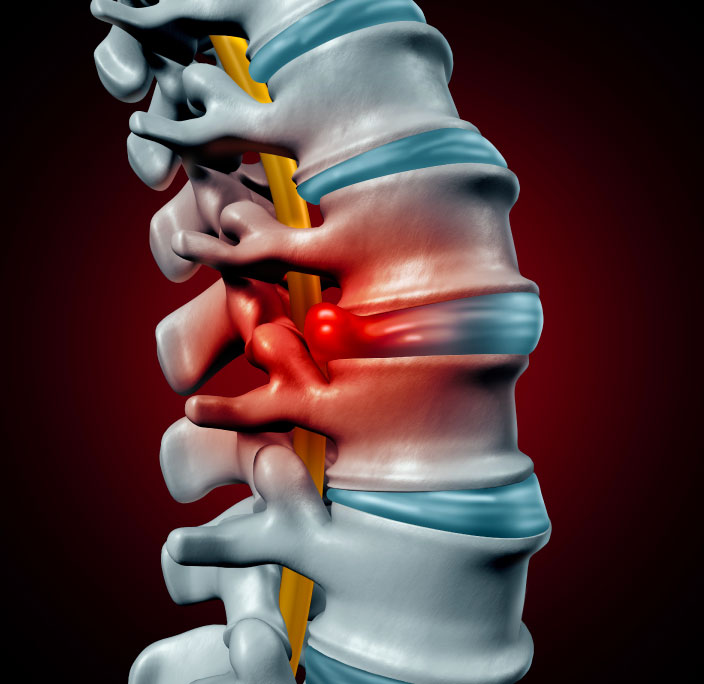
Can You Fix a Bulging Disc?
Fixing a bulging disc may seem like an impossible feat for some people. The pain, the frustration, and the length of time it can take for a bulging disc to heal can be some of the most stressful and annoying recoveries around. A bulging disc can take away your ability to enjoy your daily activities you once enjoyed. The good news is, yes, a bulging disc can be fixed through a combination of selfcare, medical treatments, and lifestyle changes. In this post we’ll be going over all of those, and more. Feel free to contact us with any questions you may have, and we’ll be happy to help.
In this guide, we’ll explore what a bulging disc is, what causes it, and the best strategies for addressing it.
What Is a Bulging Disc?
Your spine is composed of vertebrae separated by softer, gel-like discs which act as cushioning for your spine through providing flexibility and absorption of shock. A bulging disc may occur when one of these discs protrudes beyond its normal boundary, leading to a pressing action against nearby nerves.
A bulging disc is not exactly the same as a herniated disc, where the inner-gel material leaks out. While a bulging disc may sometimes lead to pain or nerve symptoms, it may also be entirely asymptomatic.
What Causes a Bulging Disc?
Several factors can contribute to the development of a bulging disc, including:
• Age-related degeneration: The discs naturally lose water content and elasticity over time
• Poor posture: Slouching or prolonged sitting can increase pressure on the spine
• Injury or trauma: Accidents or sudden movements can strain the discs
• Repetitive stress: Activities that involve frequent bending, lifting, or twisting
• Obesity: Excess weight places additional pressure on the spine
Can a Bulging Disc Be Fixed?
The term “fix” may mean different things to different people, ultimately depending on the severity of the condition. Some bulging disc cases may easily resolve on their own in due time, other bulging disc cases may require medical intervention to alleviate the symptoms and prevent further worsening of damage. Here’s what you can do today to possibly help resolve your bulging disc issue.
Self-Care and Lifestyle Adjustments
• Rest, But Stay Active: Avoid activities that worsen your symptoms, but don’t stay inactive for too long. Gentle movement may help maintain flexibility and reduce stiffness
• Practice Good Posture: Sit and stand with your back straight, shoulders back, and feet flat on the floor
• Weight Management: Losing excess weight can reduce the strain on your spine
Non-Surgical Treatments
Physical Therapy
A physical therapist can create a customized exercise program to strengthen your core and back muscles, improve posture, and relieve pressure on the affected disc
Pain Management
Over-the-counter pain relievers, anti-inflammatory medications, or muscle relaxants can ease discomfort
At-Home Remedies
Hot and Cold Therapy
Apply ice packs to reduce inflammation, and use heat packs to relax muscles and improve circulation
Stretching & Yoga
Gentle stretches like the child’s pose or cat-cow can improve flexibility and alleviate pressure on the disc
Ergonomics
Adjust your workspace to promote proper posture and reduce strain during daily activities.
Medical Interventions
Epidural Steroid Injections:
Injections can reduce inflammation around the affected nerve and provide temporary relief.
Decompression Therapy
Spinal decompression therapy, often done with specialized equipment, may help relieve pressure on the bulging disc
Surgery (In Severe Cases):
If conservative treatments fail, surgery may be recommended. Options include discectomy (removing the protruding part of the disc) or spinal fusion in more severe cases.
How Long Does It Take to Heal a Bulging Disc?
Depending on the severity of your bulging disc condition and your chosen treatments, your bulging disc may be resolved within just a few weeks to a few months with proper care. In some cases, a bulging disc may continuously persist without causing significant symptoms, allowing individuals to live with the condition as long as they continue to properly manage their lifestyle and have the right level of treatment on a regular basis.
Preventing Future Bulging Discs
Once your symptoms improve, focus on prevention to protect your spine in the future:
• Strengthen Your Core: Regular exercises like planks or bridges can stabilize your spine
• Lift Properly: Bend at your knees, not your back, and avoid twisting while lifting heavy objects
• Stay Active: Engage in low-impact activities like swimming, walking, or yoga
• Maintain Good Posture: Use ergonomic chairs and adjust screens to eye level
Contact Neurosurgery & Spine Consultants Today for Help with Your Bulging Disc
A bulging disc doesn’t have to be a lifelong issue. With the right level of care and preventative measures, most individuals will find their bulging disc is effectively managed, symptoms are alleviated, and they’re able to regain control of their life while living it to the fullest.
If you believe you may have a bulging disc, you’ll want to contact us using the form below and we’ll be sure to schedule you for an appointment as soon as possible. We look forward to hearing from you soon and we’re excited to develop a plan to resolve your bulging disc issue as soon as possible.
DISCLAIMER: No content on this site, regardless of date, should ever be used as a substitute for direct medical advice from your doctor or other qualified clinician.